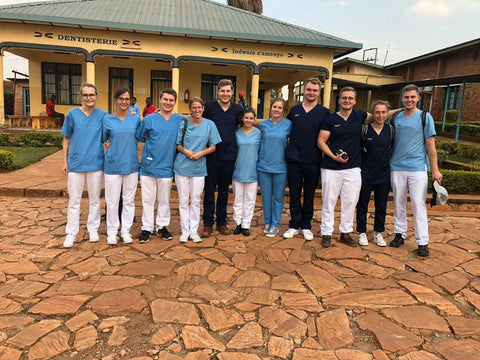Internship report | Rwanda 2019 - Dentists from Hanover on the road in Rwanda

Contact/Organization:
Oral Health Foundation Rwanda
www.rwandadentist.org
info@rwandadentist.org
Hannover Student Council, Hannover Medical School
www.zahnmedizin.mhh-asta.de
fachgruppezm@mhh-asta.de
In the East African country of Rwanda, over 60% of children suffer from toothache. For adults, the numbers are even more dramatic due to accidents and illnesses (e.g. AIDS, malaria, oral cancer). Due to the urban concentration of dental professionals in the capital city of Kigali, there is little to no guarantee of comprehensive care for the population. The situation is made more difficult by the fact that the largely poor rural population has limited financial means.
We, a group of dental students from the Hannover Medical School (MHH), wanted to establish a clinical internship project at our university to help the rural population of Rwanda. In order to realize this project, we went in search of a strong cooperation partner. We found one in the “Oral Health Foundation Rwanda”.

The Oral Health Foundation Rwanda is a Dutch aid organization founded in 2006. The aim of the NGO is to promote the expansion of the dental infrastructure in Rwanda, to improve the general and oral health of the population and to reduce the precedence of caries and other oral diseases. In addition to dental treatment for people in need, the work of the OHFR also includes prevention programs at local schools.

The on-site project took place from 9 to 20 September 2019.
On the first day, the 11 students from Hannover Medical School who had travelled with them, the team of 8 local dentists and the founder of the OHFR, Christiaan van Es, met for an introductory event in Kigali. During this event, the organisation of the project, the theoretical foundations of the local working methods and the local customs were discussed. There was also a personal exchange within the team.


The first dental camp took place at Remera-Rukoma Hospital from September 10 to 13. In the hospital's dental clinic, which was founded in 2012, the patients were able to receive adequate care from the German students under the supervision and in cooperation with local dentists. In order to cope with the large number of patients, the team split into two groups. The first group carried out an initial screening in which the type of care was determined in order to ensure that the patients were treated correctly. The second group was then able to carry out the previously planned treatment, thereby increasing efficiency many times over. Before the start of daily treatment, a presentation was held for all patients as part of the "Dental Prevention Program (DPP)", in which the basics of oral hygiene and tooth brushing were explained.


Further treatment took place from September 16th to 17th in Nyamata Hospital. Here we were able to apply the successful concept from Remera-Rukoma once again. We also visited the genocide memorial there and were able to gain a deep insight into the history of the country.
We used Wednesday, September 18th, to visit the "Little Angel School" in Kigali. We were warmly welcomed there with singing and dancing. Afterwards, we gave the approximately 150 children detailed instruction on how to brush their teeth properly and carried out a personal screening in the classes. After the screening, each child received a toothbrush and toothpaste.

In numbers, 2174 patients were treated in the short time on site. The treatment included 1475 extractions, 42 fillings and 211 scalings. In addition, 202 consultations and 244 referrals to dental clinics were carried out. In addition, each patient received a new toothbrush, toothpaste, pain medication and, if necessary, an antibiotic.


We use the free time between treatment days as a group to get to know the country and its culture better. On Saturday, September 14th, we drove together to Akagera National Park. On Thursday, September 19th, we studied the country's history in detail. We visited the Kigali Genocide Memorial, where the history, the genocide in the early 1990s, the reconstruction and the culture of remembrance were comprehensively examined.

During the two weeks of the project, there was a lively exchange between the German students and the Rwandan dentists, from which both sides benefited greatly. We were able to bring dental care to financially weak regions and thus help many people. In addition, we collected a wealth of experiences and impressions that we are taking back to Germany.
We are very grateful for this time and hope that this project will continue to develop positively in the coming years. We would like to express our special thanks to the MHH Alumni Association, Pluradent, Hörmann and all other supporters.


















